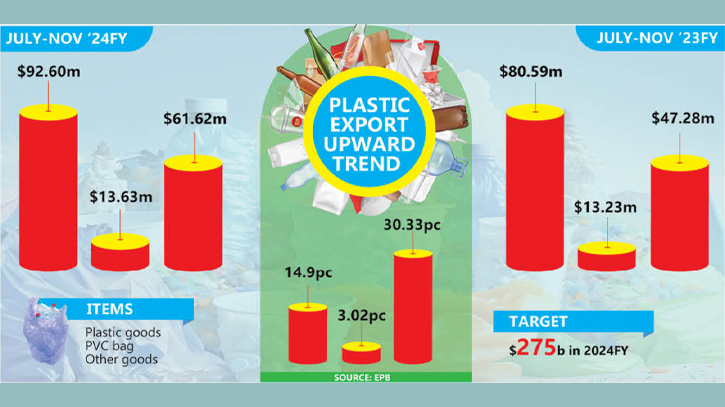
Photo : Messenger
In a prolonged economic slowdown globally, a country's plastic manufacturing sector has been maintaining steady growth over the years against the backdrop of growing demand for plastic products in domestic and international markets.
According to the Export Promotion Bureau (EPB), plastic goods exports grew by 14.9 percent to $92.60 million in five months during July–November 2024 FY.
At the same time last year, the export of plastic was $80.59 million. However, the sectors have set a target for the year of $275 million for the 2024 FY.
“The demand for Bangladesh’s plastic is rising in the global market day by day. Though we are not satisfied with the export, in this dull market, this amount is not bad,” Joshim Uddin, Vice
Chairman of Bengal Group of Industries, told The Daily Messenger.
“As our big markets are China and Japan, our market is less affected by the war than the EU and USA. That has resulted in the export of plastic growing even in adverse economic situations,” he added.
He said: The potential sector needs the policy support of the government. If the sector gets a subsidy, it might grow like RMG.
Meanwhile, the country's plastic manufacturers have set a new target of securing a 3 percent share of the $570 billion global market by 2030.
Bangladesh Plastic Goods Manufacturers and Exporters Association President Shamim Ahmed said, "To make this happen, we need a 10-year tax holiday and other policy support from the government. We also need an uninterrupted power supply for our industries. He demanded the withdrawal of value-added tax on plastic toys and crockeries.”
"Although the global economic crisis amid the Russia-Ukraine war has affected our business, we are still hopeful about the success of the sector," he adds.
Centre for Policy Dialogue (CPD) Research Director Dr. Khondaker Golam Moazzem said, "If we want to diversify the country's export basket, the plastic products could be a good option as their year-on-year earnings from the shipment are growing even in inflation."
The government should encourage more local and foreign investments for the expansion of world-class production as well as exports, he said.
Dr. Moazzem also emphasised the setting up of a special economic zone for plastic product manufacturers.
However, the manufacturers said Bangladesh's share in the global market is still insignificant, as the size of the international market for plastic products is $546 billion to $600 billion. Currently, Bangladesh contributes only 0.01 percent to the global market.
Messenger/Disha








